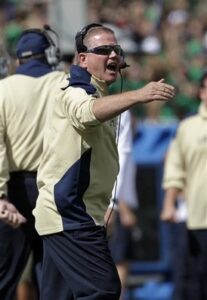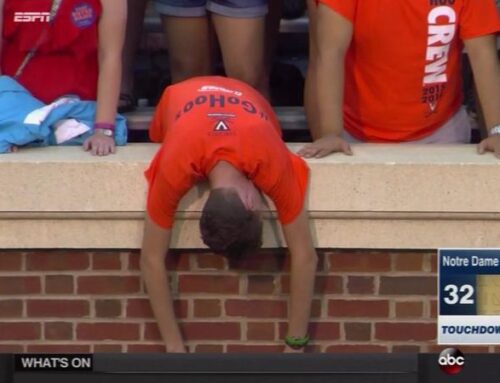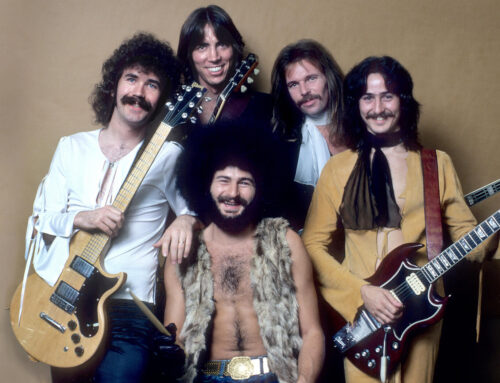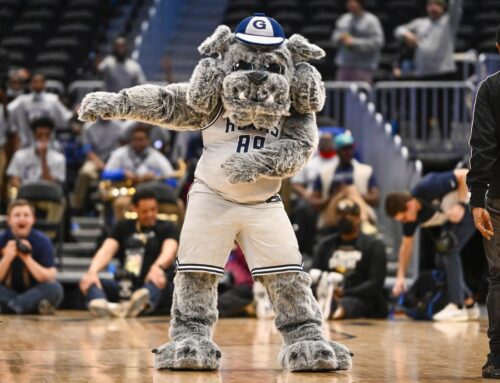Confession time: I don’t hate Charlie Weis. I never did, and absent some story surfacing about heinous behavior of his, I’m sure I never will.
This isn’t necessarily a popular take among Notre Dame football fans. Weis, after all, was the last of three (four, if you count the week-long George O’Leary era) failed football coaches in what is sometimes dismissively considered the “Davweisingham” era.
For 13 straight seasons, almost nothing went right for the football program under Bob Davie, Tyrone Willingham, and then Weis. (Davie and Willingham ended their tenures with the exact same .583 winning percentage, and incredibly, Weis was sitting at .583 too until he lost to UConn, after which he privately received the axe – it didn’t become public until after the subsequent Stanford loss.) Since Brian Kelly has come along and at least restored the program to consistent competitiveness, those 13 seasons all kind of lump together for many Irish fans.
The fact that Weis was last of the three coaches of that time probably made his failure as Notre Dame coach seem even more pronounced than the others, as the Irish fan base was sick to death of losing by the time his tenure went down in flames. It probably didn’t help that he received a then-gigantic 10-year contract extension after coaching six games at Notre Dame – Kevin White panicked upon hearing some Weis/NFL rumors and didn’t want any more bad press after the Willingham firing fiasco. Retroactively, Weis’ disastrous tenure running Kansas has made him look even worse.
More to the point, Weis’ public demeanor could always be charitably described as “abrasive”. He was not and is not what you would consider a nice man. Many people have a “Weis is a jerk in non-football-related public settings” stories, and I’ve heard a lot of them. (He once came with his family to see a movie at a theater where I worked, and I took their concession order – I think his wife Maura actually handled the transaction. He was silent and clearly had an air of “don’t even freaking think about talking football with me right now” about him. Not that I blame him.)
Anyway, all of these things and more contribute to Weis’ negative image among Notre Dame fans. I’m not here to argue with that image, only to say that I personally don’t hold the same level of antipathy for Weis that I do for the two yutzes that preceded him.
Why? A few key reasons.
He tried
This might seem an obvious thing to want out of a coach, but as Irish fans learned from Willingham, it’s not. The last couple of years of his tenure were recruiting atrocities; a coach actively trying to sabotage the program could hardly have turned in classes worse than Willingham’s 2004 and 2005 signing classes, which between them included four four-star players, according to 247Sports, and zero five-stars. (For a frame of reference, Minnesota has signed six total four-star players in the last two recruiting classes, ranking 38th in each of them.)
Willingham didn’t even have the courtesy to have full classes’ worth of flotsam, taking only 31 signees combined in those seasons, which effectively put ND on self-imposed NCAA probation. (Those four-stars, by the way, were Anthony Vernaglia, Junior Jabbie, Joey Hiben and DJ Hord. Bang-up evaluations, Ty.)
So awful were these classes that I distinctly remember even at the time that ND fans put way too much store by the decision of Darius Walker to come to ND. Walker – who did, of course, go on to have an excellent career here – was a three-star who would barely elicit a raised eyebrow were he to come along now and commit to Kelly, but at the time he was a pot of gold.
Weis showed up and delivered immediate recruiting results, blowtorching the lie that ND couldn’t bring in top talent. His first full class, the signing class of 2006, was ranked #5 in the country by 247Sports and included four-year starter Sam Young. (The rest of the class didn’t end up being that good, but hey, this stuff is an imperfect science.) His second full class ranked #6 and included Jimmy Clausen, Golden Tate, Armando Allen, Robert Hughes and Harrison Smith, among other contributors.
Of course, the most famous class to illustrate Weis’ ability and desire to get guys to South Bend was his third, which ranked #2 (#1 by some) despite coming off 2007’s 3-9 disaster. (Remember those 2004 and 2005 recruiting classes? Those guys were juniors and seniors in 2007. Just thought I’d mention it.)
That class included Michael Floyd, Kyle Rudolph, Jonas Gray, Robert Blanton, John Goodman, Kapron Lewis-Moore and others. Weis added more stories to the “Weis is a relentless recruiter” bucket when he managed to get Manti Te’o to Notre Dame a year later despite then-juggernaut USC wanting him bad and despite Te’o’s official visit coming in a pathetic loss to Syracuse in 2008 in the freezing cold. At one point Weis flew to Hawaii just to watch Manti’s high school game and then immediately flew back to South Bend without even staying overnight – or actually talking to Te’o, since by NCAA rule he could not.
He was arrogant, but the fan base needed that at the time
Weis’ two immediate predecessors were a guy who did nothing but complain about how hard it was to recruit to ND (Davie) and a guy who didn’t even bother to try (Willingham, as illustrated above). The demeanor with which those two treated Notre Dame’s unique place in college football lent itself quite easily to the omnipresent “ND can’t win big anymore” narr
Fans my age, too young to remember 1988 or the early ’90s, were so beaten down by the program’s failures that some of us weren’t even sure dumping Willingham was the right move at the time – in retrospect, that seems absurd. Even when word got out that Weis had been hired, the name didn’t really move the needle, especially after the publicly failed courtship of Urban Meyer, who had picked Florida over his so-called dream school.
Weis wasn’t having any of that nonsense. He famously described ND’s “6-5 football team” as “not good enough” in his opening press conference and did the off-season media car wash with a clear message: I’m sick of hearing about this team losing and I’m going to fix it.
It was, of course, arrogant rhetoric, and it would prove to be wrong – the phrase “decided schematic advantage”, invoked in a private meeting with the team, is now forever part of the college football lexicon. But for two seasons, at least, Weis seemed to be backing up his talk. The Irish’s 9-3 record in 2005 included seven pretty easy wins, plus a thrilling win over Michigan in Ann Arbor that still marks the most recent ND win in that godforsaken place. Even the relative disappointment (given preseason expectations) of 2006 was a 10-3 season in which the Irish beat everyone they should have, even if it wasn’t always easy.
With 2021 hindsight, it’s easy to look back and talk about Weis’ arrogance given how stupid his failure as coach makes it look. That said, when he got here, things had been bad for basically a decade straight. Enthusiasm (anecdotally speaking) seemed to be at a low ebb. ND fans were losing faith in the program. Basically, most of what I said last year about how poorly Brian Kelly’s first season at ND was going in 2010 applies here.
I think this fan base needed a guy that said, in effect, “Screw this. We’re Notre Dame, and we’re going to win, and we’re not going to feel bad about it.” Again, Weis clearly ended up being the wrong person to get that done. But for a couple of years, at least, Irish fans finally got a taste of what it might be like to be elite again – some, like me, for the first time they could remember. And it made them want more.
He set the table for who was next
Unlike Davie and Willingham, Notre Dame football was unquestionably in a better place when Weis was fired than it had been when he was hired. Yes, ND was coming off three consecutive .500 or worse regular seasons, but the recent 2005 and ’06 seasons were still proof of concept, and only a blind man could fail to see the talent and the potential that had been squandered in 2009. The NFL certainly didn’t miss it; it’s incredible, looking back, at how many guys on that 2009 team spent a decent amount of time on pro rosters, several of them having very good careers. (Hell, a couple are still going even now.)
That talent was reflected in the pool of coaches who were interested in the Notre Dame job after Weis was sent to pasture, especially by comparison to the searches that came before. The Irish made what would probably have ended up being a decent hire in O’Leary after Davie, but when that went down in flames, they crawled to Willingham and basically begged him to take the job for lack of better options. After Willingham failed, ND had very little option except a doomed pursuit of Urban Meyer. (Tom O’Brien? Tom Clements? Oof. Jeff Tedford, who might have been decent, quickly signed an extension at Cal.) According to a Chicago Tribune article of the time, Weis wasn’t even originally contacted, which doesn’t say much for the people leading the search.

Brian Kelly came to South Bend in part because it’d been shown he could win here.
Not so in 2009. There’s reason to believe the Irish had interest from, among others, Bob Stoops and Gary Patterson, both of whom were at or near the top of their game at that point. Of course, we know they landed on Kelly, who was probably the most coveted up-and-coming coach in that off-season cycle. And Kelly, in his 3rd season at the helm, rode some key players recruited by Weis (including Heisman runner-up Te’o) to a dream regular season that propelled the Irish to the BCS title game. He’s now on the precipice of his 12th season and will surpass Knute Rockne in games won at the school this year.
Weis ultimately failed in South Bend, and failed big time. But by at least proving, however briefly, that the canards about Notre Dame not being able to recruit with the elite or elbow their way into the title picture on occasion were just that, he allowed Irish fans to dream that things could get better and made the job attractive enough that a good coach everyone wanted could come along and bring about those better days.
And that’s why I don’t hate Charlie Weis.





Nice article. My time at ND was during the Davie/Willingham years so I am familiar with the lows from that period. Weis, with his confidence/arrogance, was a nice change and he did provide some good seasons along with a clear uptick in recruiting. It’s a shame that he could not win more with Clausen, Tate, and Floyd in his final years — but, as you noted, those final Willingham classes were brutal and when those classes were seniors, there was going to be a big drop-off. I remember Pete Carroll saying that he could see that drop coming because of the Willingham recruiting nightmare.
Yeah but…
Weis’s first year was my junior year. So between winning 3 super bowls with NE, and his first two seasons at ND, he will probably always be my favorite coach. It helps that we won the ticket lottery my senior year, had front bench row behind the yellow seats, directly behind Frank Eck and his very attractive blond German (I think) companion.
Weis was the beginning of the turnaround for ND. This seemed clear when they were able to hire BK, and is even more obvious now. He just wasn’t a good head coach.
I’m hesitant to give Weis much credit for any kind of turnaround. He created the need for such a thing because his incompetence caused the program to bottom out in 2007. The following five years were basically a long slog out of that disaster. It’s noteworthy that the 2012 team was the first without any players who were on the 2007 team. 2007 did serious, serious damage to the health of the program. If there was a turnaround, it was in spite of Weis, not because of him.
Yes 2007 was very bad, but the final years of Willingham and his poor recruiting (3 to 4 years earlier) were a big cause of the bottom dropping out in 2007.
Of course. I remember in the 2007 spring game, the OL had to play for both teams because we literally did not have enough offensive linemen to fill out a two deep.
But Weis had two years to prepare for that and did essentially nothing to mitigate the damage. For example, he never played Sharpley in garbage time in 2006 to get him ready for game speed the next year. And of course, his arrogant, disastrous experiment with the spread option blew up the season on the launch pad. He took what should have been a 6-6 type team and turned it into a complete disaster that took five years to fully recover from. Given that, I’m not very forgiving of a guy whose biography was titled “No Excuses.”
Yeah I have mixed feelings. On one hand, those two seasons were great and watching those Brady Quinn games with my dad and brothers are some of the best childhood memories of mine.
I went to KU and was excited when he was hired during my freshman year because I thought he was a good recruiter and had learned from his mistakes at ND. He immediately signed Dayne Crist and Jay Heaps, but unfortunately, he kicked off half the team pretty quickly and signed a bunch of JUCO recruits–most of whom never showed up on campus. David Beaty was awful and made the same mistakes, but Weis is pretty much the reason KU has been historically bad for the last decade. We’ve been on a self-imposed death penalty since Weis because we haven’t had the counters needed to get back to 85 scholarships. This coming season might be the first year we’re back at 85 and I think that is only because of the extra covid year given to seniors. I know it’s KU, so I’m not expecting lots of football success, but some stories from the football program make it sound like Weis was incredibly lazy at KU and was clearly just collecting a paycheck…
I did have a class with his son, and can say he was very kind and humble in my few interactions with him, so I wish him all the success in the world.
I guess he set up ND for future success with Brian Kelly, but the Jayhawk in me is forever pissed that I was deprived of a college football experience while in college.
I would hate him if I were you. Just like I hate Ty.
I was a student for 4 of Weis’s 5 seasons, 2005 though 2008.
I don’t hate the guy for the reasons you outline. But he was a very, very bad college football coach who produced a lot of awful memories, especially later in his tenure. In the span of one month, November 2008, Weis:
-Lost at home to Pitt in quadruple OT
-Got shut out by Boston College
-Lost at home on Senior Day to a Syracuse team that had already fired their coach; this is arguably the worst loss in school history
-Lost 38-3 to Southern Cal and did not get a first down until the last seconds of the third quarter
I don’t wish him ill, but I do not remember him fondly and I’m very glad he’s gone.
November 2008 was definitely real bad. (November 2009 was real bad, too!) I was at that Pitt game. Not my favorite.
Another 2008 gem that’s often forgotten: We were a lucky fumble away from losing to San Diego State at home on opening day. That would have unquestionably been the worst loss in school history; SDSU went 2-10 and only beat one FBS team. They lost to Cal Poly the week before they played ND.
My two thoughts walking away from that game were “ooh we’re gonna be bad” and “ooh Michael Floyd is going to be good”
Yep.
I have a vague memory of House Rock Built (I think) analyzing the 2008 offense and concluding it was only better than 2007 because of the presence of Michael Floyd.
You and I were the same year. IMO (a) you’re totally right about all that but also (b) 2005 was magic
I don’t hate him either. Plenty of warts and bad times like others have pointed out, but 2005 felt like the first time in my consciousness (was a little too young in ’93) that Notre Dame ever really had that great season going and was showing why it was still special. The program did go through hard times with/after Weis, but I do kinda feel like he was that bridge to keep a lot of the magic going that was really dormant post-Holtz.
Weis showed it was still possible in the 2000’s for Notre Dame to recruit like a top team, and for a stretch, play on the field like one. Not gonna say they were doomed without him, but I think he helped prolong some relevance.
You know, I never really minded Weis…for a lot of the reasons you mentioned. But this trip down memory lane really is making me think much worse about him. ND was in such a low place before he got here that any bright spot felt like the Red Sea parting and us finally making our way to the promised land. Too bad the sea couldn’t stay parted. I feel like one of those abuse survivors…”show us on this doll where Notre Dame football hurt you.”
Those were really terrible years. The less I think about them, the better.
His son played baseball with my brother at one point in his teens. Charlie would go to nearly every game, but he would bring a lawn chair and sit down the foul line to watch. My dad also wasn’t a big fan of sitting around other parents; didn’t like gossip, hearing parents complain about playing time, etc. My dad said Charlie went out of his way to introduce himself and say hello every time and maybe make small talk for a few minutes. They didn’t become friends or anything, and my dad hated him as a coach, but he said he was a nice enough person.
He thinks it wasn’t so much that Charlie looked down on people or thought he was above them, but that the job just demands that you be personable and on, all the time, so off the field he just wanted some peace and quiet. (I always assumed he was an arrogant jerk until my dad attempted to convince me otherwise).
I agree that Weis’ success in recruiting, and his success in developing (at least) offensive talent, showed the college football world that ND could still recruit with the big boys, and could achieve some success on the field (I will always remember the euphoria after his back-to-back wins at Pitt and Michigan, respectively, at the beginning of his tenure). It is probable that he left Kelly with some talent when BK showed up in 2010, and was able to do some things with his first two teams. It’s entirely possible that he was a big help in the long rebuild that ND had to undertake after the Davie/Willingham disaster.
The question is whether Weis was absolutely necessary to our rebuild. Here is where I disagree with your article, Andy, to the extent you think we couldn’t have done it without him. Here’s a thought experiment. Let’s assume Meyer accepts the HC job at ND after Willingham’s firing. Is there anyone who doesn’t believe that Meyer would have been able to resurrect the program, and maybe even quicker than BK (of course, he couldn’t have used some of his borderline methods at ND but I’ve got to believe that Meyer could have recruited a lot of talent and utilized it well)? I think Meyer would have been successful at ND, though I don’t think he’d have been two National Championship good, just because of the constraints imposed on him by ND academics and student behavior standards.
There are probably any number of coaches that could have pulled it off after Willingham’s firing. So, though I believe Weis conferred some benefit on ND, I am still severely disappointed in his inability to back up his arrogant rhetoric. Those last three years of his tenure were a disaster. I recall reading, when BK first got to ND, that he was surprised at how undisciplined the team was, and how there were cliques among the players and favoritism existed (I don’t have access to these articles as all that happened much too long ago).
Believe me. I was a Weis supporter for a long time after he got to ND as I felt he had boosted the program out of the depths. But, consider the fact that the only team he beat that ended the season in the Top 25 was Penn State in 2006, and consider the fact that he flailed against some of ND’s easiest schedules.
I know I have the benefit of hindsight, but I’d rather have had us find someone else after the Willingham disaster. Indeed, I’m pretty sure BK would have still taken our job even if we hadn’t had Weis.
I don’t hate Weis. But I also think he largely prolonged our agony (the memory of his loss to Navy in his final year still lingers).
I don’t think the point is that no one other than Weis could have pulled off what he did, but rather that without him none of those other coaches who could pull it off wanted to come because the situation was so bad (after Willingham’s recruiting debacle).
Sure, an average coach we could have hired would have raised the recruiting level but if i’m not mistaken we hadn’t pulled in many or any elite recruits even before Willingham in awhile and the perception was that ND couldn’t recruit those players.
And so, again, that’s why few coaches who could sniff the elite ranks of coaching wanted nothing to do with ND [and this is proof if this is really true: “they crawled to Willingham and basically begged him to take the job for lack of better options” after O’Leary didn’t work out] . Why go to ND when you could go to some other blue-blood and actually recruit elite players?
Weis showed that this perception was not necessarily reality with the right coach and so allowed the possibility to get a “normal” coaching hire.
Exactly. There are 100 coaches who would have been better for ND than Weis, but none of them wanted to touch us. The only reason we even got Weis is probably because he’s an alum.
And because NFL teams weren’t hiring him (apparently they were on to something, as it turned out).
He had just won 3 super bowls with the Patriots. I had never heard any talk of the Pats wanting to move on from him. I remember people being worried about the coordinators (they lost Romeo Crennel same year), rather than being excited to move on. Of course it was a long time ago.
He went back to the Chiefs for one year after ND. KC won 10 games (up from 4-12 in 2009), made the playoffs, and Matt Cassel went to the pro bowl. Unless he quietly burned bridges (which wouldn’t surprise me, but I never heard that when I used to closely follow the Pats), his NFL resume was still quite strong.
Oh, yes. I just meant as a head coach. Recall that Weis wanted an NFL job so badly at one point that he underwent that gastric bypass surgery that went wrong and nearly killed him (and apparently didn’t work, either).
Ah, gotcha. No chance at NFL HC, and definitely what he wanted.
I’ve thought a lot about the Urban hypothetical. I don’t think Meyer ever had any intention of being ND’s head coach, but even if he had taken the job in December 2004, my guess is that he would have left after 2 seasons and ND would have ended up in even worse shape.
One last thing. Don’t you think that Weis encouraged Clausen and Floyd to leave for the NFL early, and left BK without two players that would have likely been worth at least two wins extra in BK’s first year? You just have to wonder what would have happened had those two guys stayed (I can’t remember if Tate had eligibility left, but Weis’ sin is compounded if that is the case).
Floyd stayed and played for BK.
I think Tate did leave early.
Imagine the sideline interactions between 2010 Brian Kelly and Jimmy Clausen.
Weis unquestionably loved ND. He was an alum who went to every game as a student. I highly doubt he tried to hurt BK’s team out of spite.
Do you really think there was any chance Clausen was coming back, even if Weis had stayed? Tate was already the best WR in college FB and was losing his QB, wouldn’t have been smart to stay.
Clausen came here to play for Weis, not Kelly. As soon as Weis was fired, whatever chance there was of Clausen playing here in 2010 was gone. Nothing Weis said would’ve pushed him out the door. I’m not sure what he would’ve told Tate, but he had one of the most incredible seasons I’ve ever seen at ND in ’09 – he very well could’ve won the Heisman if the team had won more games – and had nothing more to prove.
Floyd had no choice but to stay as he’d only been here 2 years, though he ended up staying the max 2 more.
Joey Hiben is a pretty good dude who was lied to about the possibility of studying architecture while also being a football player. Really got shafted. Used to see him completely naked peeing in the dorm like it was a freakin locker room though.
Thanks for a very nicely done and balanced article, Andy.
One aspect to mention: CW is yet another of so many examples of the truism that one MUST have had successful head coaching experience elsewhere to have a prayer of succeeding at ND.
A truism we should remember when the drums start beating for Marcus Freeman to be named HC in waiting.